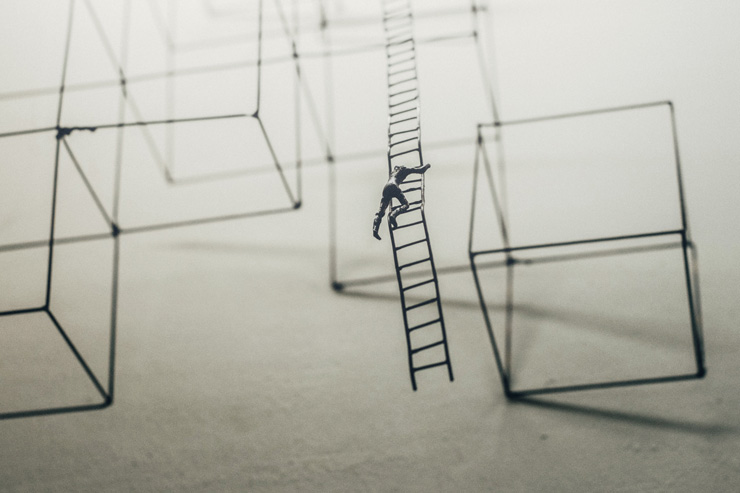
What if you could show up greater today than yesterday, and see problems as opportunities? Here are 4 tips to help you pivot and evolve, so you can.
—
Most of the world sees the COVID-19 pandemic as a crisis. For most people, the focus has primarily been on the turmoil. Loss of jobs. Concerns about money. Fear with health care. Amidst this widespread uncertainty about the future and when and how this will all come to an end, can you imagine what it would be like if you started looking at the gift in it all?
In times of change, you can either go into trauma, drama, and fear… or you can pivot and choose something different. For me, the gift of the coronavirus is that it has shown us that nature can and will fix itself if we just get out of the way. You, too, can thrive in times of change and come back greater than ever. All it takes is choice and a change in perspective.
Here are my top 4 tips on how to do that:
1. Flexibility is key to survival
The people who survive and thrive during times of crisis are the ones that are willing to be fluid in order to create something greater than what they have done in the past. Many people have the mindset that what is occurring in the world is bad and terrible and that it is going to be like this forever. No, it is not. It will change and it will end.
But what is going to happen next is going to be different than anything that has happened before. We need to accept that and then start looking at how we can change with it. Rather than holding onto old storylines and dreams about you and your life, be prepared to imagine something greater. If you only look for how you can recreate the past, you will only recreate the disaster that currently exists. To avoid this, ask yourself: “What can I create that I haven’t created before? What do I need to do or be different so I can change all this with ease?”
2. Figure out your strengths
If you have lost your job and your livelihood, it’s understandable that you are anxious about the future. But if you pivot, you can look at this change as an opportunity to explore what else is possible that you have never considered. Instead of staying in gloom and doom and anxiety, find what you are good at that other people would like to have as well. Look at your gifts and natural abilities. What strengths do you have that others might not have? What can you do that you’ve never done before?
When you create a business, a product or a service that creates more in somebody’s life — you get money. This is called benevolent capitalism. Benevolent capitalism is creating something that adds value to others, increases your money and brings greater possibilities to the world for the good of us all.
3. Use your talents and money to assist others
One of the greatest ways to pivot and evolve is to stop focusing on yourself and your problems and turn your attention to assisting others — in big ways or small. Even in times when the world is thriving, people have difficulties and challenges. This provides you with an opportunity to use your talents and money to add value to the world.
For instance, one time I went to a coffee shop with a friend and the lady serving us was very slow. She would bring one cup of coffee. Leave the table. Bring another cup of coffee. Leave the table. Back with one pack of sugar. Leave the table. On and on it went. Clearly, she was struggling, so I showed her how to pick up two cups of coffee, sugar, spoons and donuts all at the same time. She told me that she had recently gotten a divorce and prior to that had been a stay at home. Having never worked in her life, all of this was new, and she was worried she was not going to be able to handle it. When we left the coffee shop that day, I left her a $6 tip which was the same cost as the bill. She came to the table and said, “Sir, you gave me too much money.” I said, “No I didn’t. I left that so you would know that you’ve got this, and you are going to be fine.” Small gesture with big impact.
4. Use this time to ask questions
Now more than ever, ask questions and look for possibilities. Questions open the door to new things, new opportunities, and new ways of doing things. Questions asked from curiosity and wonder empower us to create something different, something that has never existed before. Continuously ask, “What else is possible?” and “If this wasn’t a problem, what would the possibilities be?” When you ask these questions, keep in mind that the point is not to find the right answer; it is to become aware of what you have not been able to perceive before.
At first glance, it would seem like companies needing their employees to work from home rather than coming into the office or factory is a major problem. But a positive side effect of this change is that there have been fewer people on the roads, which has allowed nature to reset. Animals are out and about in record numbers and the sky has not been this bight or blue for a very long time. Families have had more time to be together as the daily commute through traffic has subsided as more and more people are working remotely. As a result of these forced changes — and the upside of utilizing remote workers — employers and business owners are re-assessing how they will operate post-COVID.
How will it all look as things shift into the new normal? That remains to be seen. What I do know is that things will shift when you allow yourself to pivot from focusing on what is a problem to what is possible.
You may also enjoy reading Are You Willing to Give Up Your Utopian Constructs, by Gary Douglas
